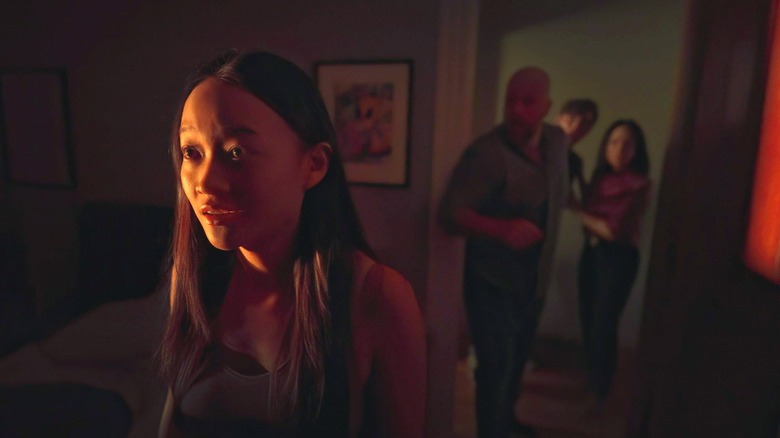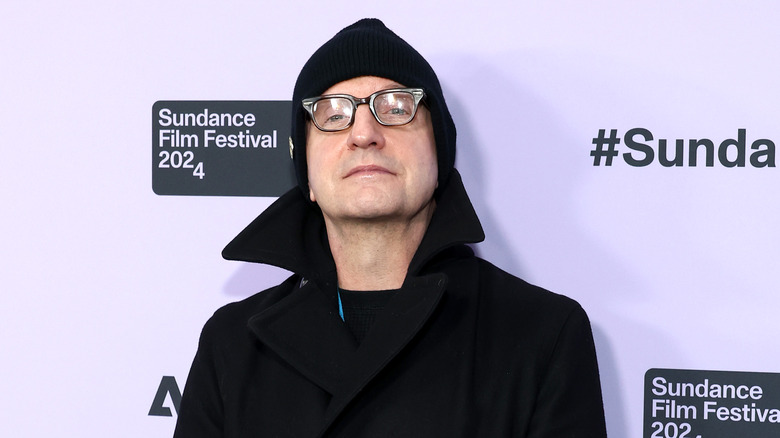Presence Review: Soderbergh Succeeds With His Unsettling Take On The Haunted House
- The ghost is incredibly well-executed
- Self-contained location adds claustrophobia and tension
- Villains don't have nuance
- Oversimplified narrative
If you want to be continually surprised by what a director has to offer, watch a Steven Soderbergh movie. He is constantly experimenting behind the camera, trying to find new ways to tell stories visually, and as a result, even his seemingly slight films have something unique that makes them worth watching. "Presence" is a twist on a traditional haunted house story, told from the perspective of the ghost. It's a simple but effective concept that is more sad than scary, but it does occasionally muster up moments of serious tension and even a few chills.
All of "Presence" takes place in the interior of an atmospheric Victorian home, which a family — parents Rebekah (Lucy Liu) and Chris (Chris Sullivan), and their two teenage children Tyler (Eddy Maday) and Chloe (Callina Liang) — buys in the very first scene. They're moving so that Tyler, a promising athlete, can join the swim team in a better school district, and from the very beginning, we get the sense that almost all of the family's decisions are made with Tyler's future in mind — Rebekah makes no secret which of her two children she prefers. Meanwhile, Chloe is quietly in crisis, her best friend having suddenly died apparently from a drug overdose. Perhaps it's because of this recent loss that she is the first one who notices there's something a little off about their new home, a presence that she senses from the first moment she enters the house.
The camera as Casper the friendly ghost
Over the course of the film, we experience moments in the family's life, glimpsed through the eyes of the spirit languishing in this tense and unexpectedly dysfunctional home. Steven Soderbergh, who often shoots his own movies, uses the camera to represent the spirit so that we view everything from its point of view. The film begins before the family has even moved in, the camera acting as a restless entity aimlessly roaming through the rooms, setting the scene for what is to come. We spend the entire film inside the house, and all of the scenes are shot with a fly-on-the-wall approach where the spirit must choose when to merely observe and when to use its energy to intervene.
The characters in "Presence" often struggle to see each other properly, but the spirit doesn't suffer from this problem: it silently bears witness to their private issues, from Chris seeking legal advice over his marriage to Chloe's burgeoning secret relationship with a popular but strangely disconcerting boy from school (West Mulholland). Because of how rigidly Soderbergh sticks to his visual gimmick, we never see the spirit itself — but that doesn't mean we don't feel its, well ... presence. It carries with it a palpable emotional weight that is so overwhelming, that all of the family members eventually feel it, even if they're not willing to admit it to themselves. Because we never leave the house, there's a sense of claustrophobia that permeates "Presence," creating the tangible and deeply unsettling feeling of being trapped in a haunted house with an unknown entity ourselves.
Which are scarier: ghosts or people?
The concept of the spirit's POV is exceptionally well-executed, that much is clear. But "Presence" is slightly let down by a lack of nuance to its narrative elements, especially in the cartoonish villains it offers up. Rebekah drunkenly confesses to her son the deep feelings of codependency she feels for him, making even the golden boy of the family feel a little bit uncomfortable. (This is on top of her nefarious business dealings, which are hinted at being deeply illegal but are all in the service of Tyler's career as a competitive swimmer.) Tyler says cruel and heartless things to Chloe about the death of her best friend and gets little more than a dressing down from his father about being nicer to her. This is to say nothing about the darkest element of the film, which is so unabashedly evil that it's actually jarring to watch play out. The performances are mostly strong, but it's difficult to escape the feeling that the ghost — a character that we never actually see on screen — is somehow the most interesting person in the entire film.
That said, "Presence" is still mostly successful, if only as a creative exercise from an incredibly talented director. The spirit of the film generates moments that are spooky, poignant, and even profound at times. As a play on the haunted house genre, there are parts of the film where it feels as though the ghost is just as trapped with the family as they are with it, so deep does their dysfunction and unvoiced sadness run. And at just 85 minutes long, "Presence" avoids committing the cardinal scene of overstaying its welcome — it's a spry, energetic, concept-driven film, and it never apologizes for that. If "Presence" isn't one of Soderbergh's most intellectually compelling projects, it nonetheless reminds us that even his "lesser" works are fascinating to watch.
"Presence" premiered at Sundance Film Festival on January 19 and will be released by Neon at a later date.


